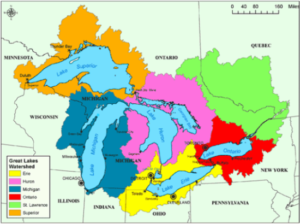Why do we need watersheds?
A watershed is the land area that channels all of the water like rainfall and snowmelt into the creeks and the streams, slowly making its way into outflow points like lakes and oceans. Watersheds come in all shapes and sizes some are huge like the Nile and some are small. One of the biggest watersheds in the US is the Mississippi River watershed. This system collects water from 40% of the US including 31 states and 2 Canadian provinces before ending in the Gulf of Mexico.

Now think of pool covered by a blue pool cover, “the blue cover represents the watershed, the area in which precipitation that falls flows down towards the lowest part of the basin, which the center of the pool cover in this case. Likewise, in nature, water flows towards a valley, river, or lake. The lake in the center of the pool forms for the same reason that a lake will form on the landscape — it is the lowest area around and the water comes in, through a river, seepage into the ground, or by evaporation, faster than it can get out. In most valleys, the land slopes downhill somewhere, in which case, a river will form.”(USGS)
But this isn’t a real watershed now, is it? There is nowhere for the water to exit! Meaning our pool watershed is actually a large forming lake.
Where ever in the world you are, you are in a watershed meaning everyday actions affect the watershed you are living in. For example, the crop fertilizer that drains into the creek can produce more blue-green algae blooms which could affect the community you live-ins drinking water this also affects the wildlife, flora, and fauna of the region.
The On the Water program sponsored and funded by a Planet Award through the Consumer’s Energy Foundation wants to have a direct and immediate impact on improving 100s of acres of aquatic habitat on a statewide level. And educate the public throughout the project areas by teaching them how to be responsible and creating a stewardship ethic for their public lands and waters through outreach conducted at cleanup and habitat events.
We have three events coming up in the next two months that we would love to see you at! Watersheds directly affect you and your community whether it is the water you drink or the lake you swim in. Come on out and do your part in keeping your local watershed clean and pristine.
-Munuscong River European Frogtbit Pull August 24th at 9 am register here
– Lake Lansing Beach Clean-Up September 7th at 9 am register here
-Fall Stewardship Day Event at Shiawassee River September 21st at 9 am register here
We are looking to make connections in your community please contact Emma Nehan at enehan@mucc.org if you would like to coordinate a volunteer event soon! For more information and to register, please visit mucc.org/on-the-water
The post Why do we need watersheds? appeared first on Michigan United Conservation Clubs.
Recent Posts



